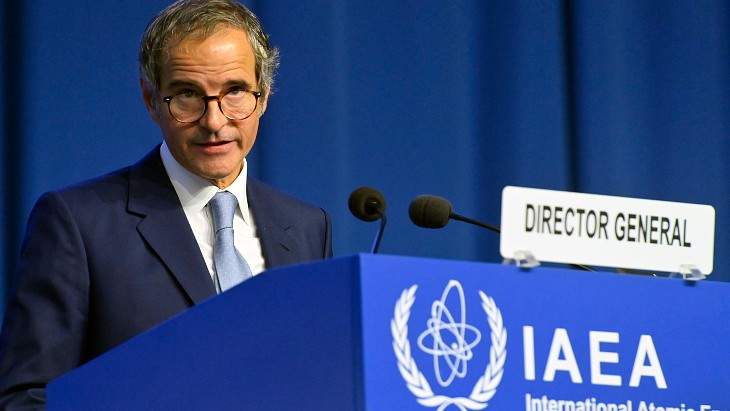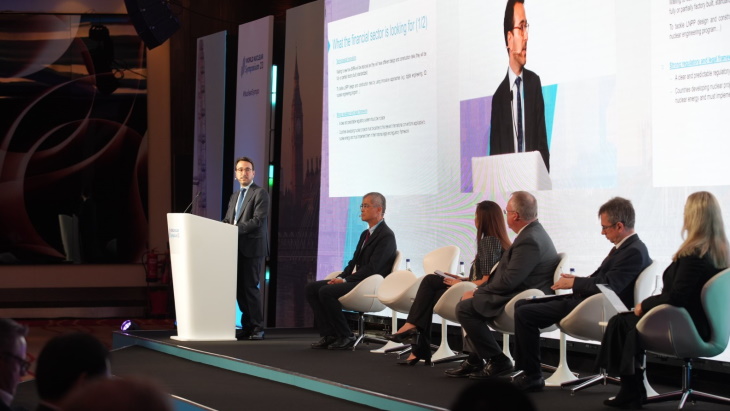Grossi stresses positive role of nuclear at IAEA General Conference
25 September 2023
Director General Rafael Mariano Grossi opened the 67th International Atomic Energy Agency General Conference by saying that opinion polls show the "tide is turning" on public attitudes to nuclear energy, but countries "still need to engage stakeholders openly and proactively" in their nuclear power programmes.
 Director General Grossi speaking at General Conference (Image: IAEA)In his opening address to the International Atomic Energy Agency (IAEA) event at its headquarters in Vienna, Austria, Grossi highlighted the positive progress of the organisation's initiatives using nuclear technology in areas of tackling climate change as well as cancer care, zoonotic disease, food safety and plastic pollution.
Director General Grossi speaking at General Conference (Image: IAEA)In his opening address to the International Atomic Energy Agency (IAEA) event at its headquarters in Vienna, Austria, Grossi highlighted the positive progress of the organisation's initiatives using nuclear technology in areas of tackling climate change as well as cancer care, zoonotic disease, food safety and plastic pollution.He said: "Our work in widening the access to life-affirming nuclear science and technology is happening against a background of seismic shifts in our climate. The horrifying consequences of global warming are becoming ever more apparent, from wildfires in North America, to heat domes, droughts and floods across Asia, Europe, Latin America, and Africa. Our climate emergency is undeniable, but so is our ability to do something about it.
"Four years ago, nuclear power was struggling to gain a place at the table in major global conversations and events on energy and climate change. Today, nuclear power not only has a place at the table but is increasingly recognised as part of the solution."
Speaking 70 years after the then US President Dwight D Eisenhower's Atoms for Peace speech to the United Nations which paved the way for the creation of the IAEA, he said that it continues to implement its safeguards and security work. He said that there was an "ever-learning mindset when it comes to building a culture of nuclear safety and security - nuclear energy is safer than it has ever been, safer than almost any other source of energy".
And he said: "In the past few years we have not been vocal enough about the benefits of nuclear power, but that page has been turned. Even as public opinion polls around the world show the tide turning in favour of nuclear energy, countries still need to engage stakeholders openly, and proactively, in their nuclear power programmes. Concerted effort and action are warranted."
Representatives of the IAEA's 177 Member States are attending the event, at which delegates will discuss a range of topics, from the 2024 budget to strengthening activities related to nuclear science, technology and applications, as well as the IAEA’s nuclear safety and security activities and strengthening the effectiveness and improving the efficiency of Agency safeguards. They will also specifically discuss nuclear safety, security and safeguards in Ukraine and safeguards in the Middle East and in North Korea. Thailand’s Ambassador and Permanent Representative to the United Nations, Vilawan Mangklatanakul, was elected as the president of the General Conference.
The opening session saw Grossi taking the oath of office for a second four-year term as director general. He said that since taking the job there had been the COVID-19 pandemic and then war in Europe: "These two events are tragic in and of themselves, but they also make it more difficult - and urgent - to tackle the ever-more-present calamity of climate change and the very serious challenges of poverty, disease, hunger and food, water and energy insecurity. I feel humbled and privileged to lead an institution with a unique mandate that allows us - everyone in this building today - to play a role in tackling these challenges."
The director general highlighted the work of the agency's staff in Ukraine, where experts are stationed at all the country's nuclear power plants, and there have been 10 rotations of staff at the Zaporizhzhia nuclear power plant, which has been under the control of the Russian military since early March 2022.
Grossi said the situation there remains "fragile". In an update published on Friday, the IAEA reported that there had now been 10 groundwater wells drilled "bringing the plant close to having a longer-term solution for the provision of cooling water" since the destruction of the Kakhovka dam in June. It said that an 11th well is due to be drilled after which the plant's operators hope they will have "the approximately 250 cubic metres of water per hour to maintain the cooling of the reactors and spent fuel pools in the current shutdown state".
The agency also said that staffing levels at the plant "continue to be a concern with a significant number of staff having left the ZNPP since the start of the armed conflict, including licensed operators from the main control rooms". The IAEA experts at the site, which is on the frontline between Russian and Ukrainian forces, also reported hearing "numerous explosions some distance away".
Successful nuclear projects key for future investments
25 September 2023
Being able to refer to success stories of nuclear power projects being completed on time and on budget, whether refurbishments or new build, will be key to securing finance for future projects, panelists in a session of the recent World Nuclear Symposium 2023 agreed.
 White & Case LLC's Julien Bocobza addressing the Symposium (Image: World Nuclear Association)
White & Case LLC's Julien Bocobza addressing the Symposium (Image: World Nuclear Association)"Nuclear energy could and should play an important role in ensuring the rapid and secure energy transitions, and investments in nuclear must step up fast," said Keisuke Sadamori, Director of Energy Markets and Security at the International Energy Agency (IEA). "Existing nuclear power plants need to be extended."
However, he noted: "While increasing year-on-year at the rate of nearly 15% from about USD37 billion in 2019 - before COVID - to USD65 billion in 2023, nuclear investments remain a small part of overall clean energy investments, around a 4% share."
Speaking during a session on Investing in Nuclear on 8 September, Sadamori said the IEA released its Nuclear Power and the Secure Energy Transitions report more than a year ago. Under the report's net-zero scenario, nuclear power needs to double from around 400 GW now to more than 800 GW in 2050. "Less nuclear power would make the net-zero transition harder, more expensive and riskier," he added.
"The resurgence of nuclear power in the net-zero scenario entails a massive increase in investments in the coming decades," Sadamori said. "Global investments in nuclear surges over USD100 billion in the first half of the 2030s in the net-zero scenario, and that's over three times the average of the 2010s."
Innovative funding models
Nuclear projects have for many years relied on state ownership or the regulated monopoly structure to guarantee revenues and reduce risks to investors, Sadamori noted. However, there are private sector investors willing to finance such projects but innovative financing mechanisms are needed to secure this funding.
"The key concern that investors see is the duration that it takes to put a project up to connection, up to operation," said Julien Bocobza, partner in the Japan office of White & Case LLC. "You've got naturally the development phase, the planning stage, which is borne by investors, by equity providers, by developers. But even once the project is approved and starts construction, the typical duration, because everything has to be customised, is around seven years.
"The impact on the financing is tremendous, in particular because it means you need to have the amount of cash available to pay interest during construction. So you are really paying lenders for seven years before you start getting any revenue, which creates issues. But also given that scale, you need a very long period to repay that loan, which then is often an issue with commercial lenders who cannot go beyond 15, 18 years typically for repayment periods."
Details about the UK's Regulated Assets Base (RAB) funding model, which is being used for financing the Sizewell C project, were outlined by Iain Smedley, chairman of power and utilities banking at Barclays. Under this model, a company receives a licence from an economic regulator to charge a regulated price to consumers in exchange for providing the infrastructure in question. He said the model "from an investor perspective, is structured to produce attractive, stable, low-risk and inflation-linked returns at scale".
Smedley added: "The RAB model is designed to set up a structure that provides a high level of certainty and confidence and predictability for investors, whilst also making sure that there are appropriate incentives in place."
Showcasing successful projects
All the speakers on the panel agreed on the need for the nuclear industry to deliver projects on time and on budget in order to attract funding from investors.
"What the financial sector sees ... is delays and cost overruns," Bocobza said. "And how will each project deal with that? Clearly for lenders, it is what they are going to look at in the first instance. They will not take that risk or they will be very reluctant to take that risk until it's clearly mitigated."
He added: "Having very successful stories about being on time and on budget will really, really help. And that's why I agree it was fantastic to hear those stories because it gives confidence. Lessons learned I think is absolutely key in the construction space, of course, but also for governments to make sure that if you're putting together a new programme you understand what worked, what didn't work, and you actually implement gateways to ensure that you make it work."
"The key here is being able to showcase to the world that we can deliver large-scale projects on time and on budget," added Kevin Kelly, executive VP, finance and CFO, Bruce Power. "And, you know, whether it's a multiple billion dollar refurbishment or new build, you got to stick to the basic principles of having your engineering done, getting your long-lead parts, having an established supply chain."
Sadamori said it should not just come down to the industry to attract the necessary finance for nuclear projects. "Governments need to have a very strong policy to ensure public awareness of the possible important contributions from nuclear for both energy security and climate change mitigation, and also, as presented, the needed financial mechanisms to ensure the needed investments in nuclear, because the current competitive unbundled electricity power systems in mostly the advanced economies are not good enough to ensure the necessary investments into assets like nuclear."
Researched and written by World Nuclear News
No comments:
Post a Comment